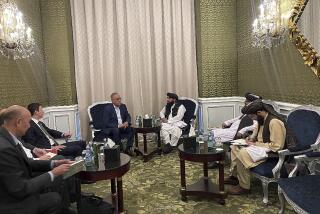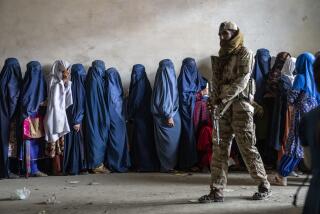NEWS ANALYSIS : Women’s Forum Reveals China’s Defensiveness
- Share via
BEIJING — Two outstanding questions loomed at the opening of the U.N. Fourth World Conference on Women that concludes here today:
The first was whether the international women’s movement could maintain the consensus on reproductive health and a woman’s sovereignty over her own body that was achieved last year at the Cairo International Conference on Population and Development.
The nearly 5,000 delegates here from more than 180 countries clearly succeeded in that regard, even adding new language on women’s sexual rights and the removal of punitive laws for women who have illegal abortions.
The second uncertainty was whether China, after 16 years of impressive economic reform, was politically mature enough to host an international conference that included open debate and dissenting views.
The answer in this case was clearly negative. Despite its rapid materialistic advances, when it comes to joining the democratic world in open dialogue, the People’s Republic of China is still not ready for prime time.
Security surrounding the conference was clumsy and often overbearing. Delegates and journalists reported incidents in which Chinese security police entered their hotel rooms, followed them in the city as they attempted to meet with Chinese friends and physically blocked them from reporting stories.
In one episode at the upscale China World Hotel, where foreign delegations and visiting business leaders often stay, a European delegate to the conference was told that she could not be interviewed in her room by a television team from her own country. When she insisted, hotel security personnel cut off the electricity to the room.
In another instance, an aide late at night pushed a note under the hotel room door of her boss, a Scandinavian political leader. When the aide returned to her room down the hall, she glanced back to see a security agent on his hands and knees trying to retrieve the note.
The heavy security prevented most Chinese, including several of the country’s most prominent feminists, from attending the conference. That meant that the only Chinese participants were delegates handpicked by the government or members of the government-controlled All China Women’s Federation.
Late Thursday afternoon, a young, unidentified Chinese woman somehow made her way to the press room in the center of the Beijing International Convention Center and distributed a two-page note in typewritten English describing the problem: “Real non-governmental groups of Chinese women--women who do not work directly for the government, such as regular women peasants and workers, women who do not want to be controlled by the government, etc.--were excluded from the conference.”
Some of the Westerners at the conference complained that the preoccupation with security and the government’s clumsy efforts to keep a lid on the delegates and the press have detracted from the accomplishments of the conference that began Sept. 4.
*
Betty Friedan, author of the classic book “The Feminine Mystique” and one of the few women who has attended all four U.N. Women’s Conferences since they began in Mexico City in 1975, observed: “Partly because of the folly of the Chinese government, the coverage has been along the lines of ‘The Chinese Government vs. The Women.’
“The real story here,” Friedan continued, “is the real empowerment of women.”
In some respects, she said, the adversarial relationship with the Chinese hosts drew the women together in solidarity against a common foe. “It gave them a focus,” she said.
The Chinese government, for its part, admitted some mistakes.
“This is the first time we have hosted such a big international gathering with such extensive participation,” Foreign Ministry spokesman Chen Jian said Thursday. “Because of the lack of experience, there are things which are not very satisfactory. We are summing up our experiences and will try to do better next time.”
At Thursday’s Foreign Ministry briefing, Amnesty International representative Casey Kelso attempted to give Chen a petition calling for the release of Chinese journalist Gao Yu and Tibetan nun Phuntsog Niydrou, who have been imprisoned by authorities.
Chen refused to accept the petition. When Kelso attempted to stage an impromptu press conference, building security turned off the lights.
In fact, the Chinese government has other concerns right now. Ailing senior leader Deng Xiaoping turned 90 last month, and a political succession struggle is shaping up.
When China first bid to host the conference in 1990, it was still trying to repair its international image after the bloody 1989 crackdown on demonstrators in Tian An Men Square. By the time the conference opened, the effort to impress the world had shifted to a campaign of damage control.
Ironically, the decision to make the women’s conference a low-profile event, at least domestically, in some ways goes against the grain of the country’s achievements.
Since taking power in 1950, the Communist government has done much to advance women’s rights: The crippling practice of binding women’s feet to make them smaller was eliminated; prostitution disappeared, and many women were brought into official ranks.
More to Read
Sign up for Essential California
The most important California stories and recommendations in your inbox every morning.
You may occasionally receive promotional content from the Los Angeles Times.










